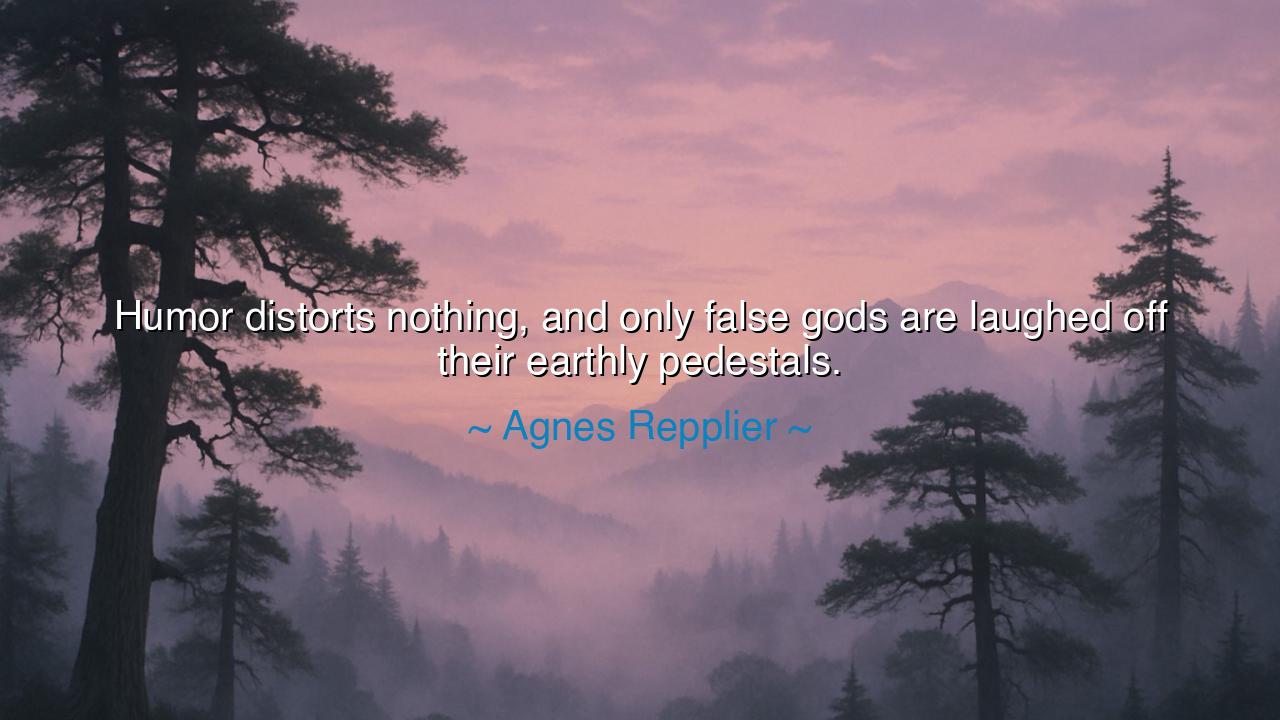
Humor distorts nothing, and only false gods are laughed off their






Hearken, children of wisdom, and attend the words of Agnes Repplier, who proclaimed: “Humor distorts nothing, and only false gods are laughed off their earthly pedestals.” Know this: true humor is a mirror, not a hammer. It does not warp reality, nor does it diminish the genuine virtues of men or the eternal truths of the cosmos. Rather, it unveils the hollow, the pretentious, and the fraudulent, casting light upon the false idols that men erect in pride, fear, or ignorance. In laughter lies discernment, and in discernment, the power to see reality as it truly is.
In the courts of Athens, jesters and philosophers alike employed wit to reveal folly without fear. Socrates, with gentle irony, exposed the pretensions of men who claimed wisdom yet knew little. His humor never distorted the essence of truth, but it stripped away the false veneers, unmasking arrogance and ignorance alike. In this manner, only the undeserving—the false gods of pride, power, and vanity—were brought low by laughter, while virtue remained untouched and even illuminated.
Consider Voltaire, that master of satirical pen, who wielded humor as a scalpel, cutting away the hypocrisies of church and state. In his epigrams and tales, he mocked superstition and oppression, yet never the eternal principles of justice or reason. The false gods—dogma, blind authority, and the tyranny of fear—were cast down by his laughter, while truth and wisdom stood firm, unscathed. Here we see Repplier’s insight: humor distorts nothing, but the hollow foundations of false power tremble before it.
Even in the modern age, humor has served as a weapon against pretense. During the American Revolution, pamphlets and cartoons lampooned corrupt officials and pretentious aristocrats, their folly exposed to the public eye. The laughter of the people did not erase the essence of governance or justice, but it revealed those unworthy of reverence, casting the false gods of tyranny from their pedestals. Here, laughter is not destruction—it is revelation, a force that unmasks deception and nurtures clarity.
Yet, the wisdom of Repplier is subtle. True humor requires discernment and empathy. To laugh indiscriminately is folly; to mock what is genuine, sacred, or virtuous is sin. The skill of humor lies in recognizing the hollow, the unearned, and the inflated, and in directing laughter toward these alone. It is a weapon of insight, a light that exposes deceit, and a shield that protects truth from distortion.
History offers another illustration in the life of Oscar Wilde, whose sparkling wit revealed the absurdities of Victorian society. Through epigrams and playful critique, he struck at pretense, hypocrisy, and shallow ambition. His humor was never a distortion of reality; it was a lens through which the hollow facades of social convention were laid bare, showing clearly which idols were false and which truths remained unassailable.
Children of the ages, the lesson is clear: cultivate humor as a discerning eye. Observe the world, notice the pretensions and falsehoods that masquerade as greatness, and allow your laughter to illuminate them. Protect truth and virtue from ridicule, but do not hesitate to cast down the hollow idols that feed pride and ignorance. In this way, laughter becomes not frivolity, but wisdom, guiding the soul to clarity and discernment.
Practical action follows naturally. Sharpen your observation, temper your wit with insight, and direct your humor toward folly and falsehood, not toward the genuine or the virtuous. Share laughter that enlightens, corrects, and reveals, so that others may see the empty pedestals of deception. In this way, as Repplier teaches, humor distorts nothing, yet it holds the power to elevate truth, unmask the false, and preserve the honor of what is real and worthy.






AAdministratorAdministrator
Welcome, honored guests. Please leave a comment, we will respond soon